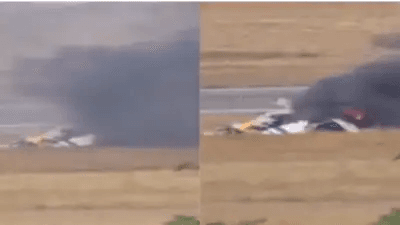Porbandar, Gujarat — On January 5, 2025, a routine sortie turned into a heartbreaking disaster as an Indian Coast Guard Advanced Light Helicopter (ALH) crashed during landing at Porbandar airport. The tragic incident claimed the lives of all three crew members aboard, leaving the nation mourning and raising critical questions about aviation safety.
The Sequence of Events
The crash occurred at approximately 12:10 PM when the helicopter was returning from a scheduled patrol mission over the Arabian Sea. Eyewitness accounts suggest that the ALH MK-III appeared to lose stability as it approached the runway. Moments later, the aircraft hit the ground with a thundering impact and caught fire.
“We heard a loud bang, and within seconds, flames and smoke engulfed the helicopter,” said Sunil Patel, a worker near the airport. Emergency responders, including fire tenders and medical teams, were dispatched promptly, but the inferno was intense, complicating rescue efforts.
The severely injured crew members were pulled from the wreckage and rushed to a nearby hospital. Despite the medical team’s best efforts, all three succumbed to their injuries, which were described as extensive burns and trauma.
A Grieving Nation
The identities of the deceased crew members have been withheld to allow their families time for private grieving. Condolences have poured in from across the country, with Prime Minister Narendra Modi tweeting, “Deeply saddened by the loss of three brave souls in the Coast Guard helicopter crash in Porbandar. Their service and sacrifice for the nation will not be forgotten.”
Questions About ALH Safety
This incident is not an isolated one. Just four months ago, in September 2024, another Indian Coast Guard ALH MK-III crashed into the Arabian Sea off the coast of Porbandar, resulting in the deaths of three crew members. Both crashes involved the same model of helicopter, raising concerns about the safety and reliability of the ALH MK-III fleet.
Developed indigenously by Hindustan Aeronautics Limited (HAL), the ALH MK-III is a versatile helicopter used for search-and-rescue operations, surveillance, and medical evacuations. Despite its advanced features, the model has faced scrutiny in recent years due to mechanical glitches and a series of mishaps.
Preliminary Investigation
Initial reports suggest that the crash might have been caused by a technical malfunction during landing. A senior Coast Guard official, speaking on the condition of anonymity, stated, “The helicopter underwent routine maintenance checks before the sortie, and no issues were flagged. However, a detailed investigation is underway to determine the exact cause.”
The Directorate General of Civil Aviation (DGCA) has also been roped in to assist with the investigation. Black box data and cockpit voice recordings will be crucial in piecing together the final moments of the ill-fated flight. Experts believe that adverse weather conditions, pilot error, or a critical system failure could be potential factors.
The Cost of Protecting India’s Shores
The Indian Coast Guard plays a pivotal role in safeguarding the nation’s maritime interests, patrolling over 7,500 kilometers of coastline and conducting rescue missions in challenging conditions. The loss of three skilled personnel underscores the risks faced by these guardians of the sea.
Defence analyst Lt. Gen. (Retd.) Rajesh Singh noted, “While the Coast Guard’s responsibilities have expanded significantly in recent years, the resources and technology at their disposal haven’t kept pace. Incidents like these highlight the urgent need for a comprehensive review of operational protocols and equipment maintenance.”
A Call for Systemic Overhaul
Following the crash, aviation experts and former service personnel have called for a thorough review of the ALH program. Dr. Meera Sinha, an aviation safety consultant, emphasized the importance of proactive measures. “We cannot afford to wait for more lives to be lost. Regular audits, rigorous pilot training, and upgrading avionics systems are essential steps to enhance safety,” she said.
The Indian Coast Guard has announced a temporary suspension of all ALH MK-III operations pending the investigation’s outcome. This move, while necessary, poses logistical challenges for a force already stretched thin.
Remembering the Fallen
The tragic loss of three Coast Guard personnel serves as a stark reminder of the inherent dangers of serving in the armed forces. Candlelight vigils and memorial services are being organized in Porbandar and other cities to honor the fallen heroes.
“They were more than just officers; they were sons, fathers, and brothers,” said a tearful local resident who attended a vigil. “Their sacrifice will inspire future generations to serve with the same dedication.”
The Road Ahead
As investigations continue, the focus must remain on preventing future tragedies. The government and armed forces are expected to collaborate closely to address safety concerns and modernize equipment. Lessons from this incident could lead to systemic changes, ensuring that the sacrifices of these brave souls were not in vain.
For now, the nation pauses to reflect and pay tribute, united in grief and gratitude. The story of the Porbandar crash is not just one of loss but also a call to action—a call to prioritize the safety of those who protect us every day.
Also read-
1. Yemen, 5 Key Questions: What Does the Recent US-UK Airstrikes on Yemen Mean for Global Stability?
2. How Did a Bus Bombing in Pakistan Claim Over 60 Victims? Tragedy in Balochistan Explored

